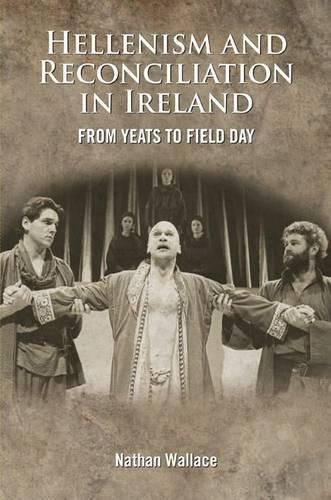Readings Newsletter
Become a Readings Member to make your shopping experience even easier.
Sign in or sign up for free!
You’re not far away from qualifying for FREE standard shipping within Australia
You’ve qualified for FREE standard shipping within Australia
The cart is loading…






Largely inspired by the South African Truth and Reconciliation Commission of the 1990s, scholars from a range of disciplines have produced numerous books and conferences on the topic of reconciliation around the world over the past two decades. This book provides a literary genealogy of the concept in Ireland, where W.B. Yeats, Conor Cruise O'Brien, Tom Paulin, and Seamus Heaney have all associated it, paradoxically enough, with Sophoclean tragedy. In the early twentieth century Yeats borrowed a theory of cultural Hellenism from Matthew Arnold in order to promote the Abbey Theatre as a reconciling institution in the Irish Free State. In the 1960s Conor Cruise O'Brien espoused Arnoldian Hellenism but nevertheless used Antigone as an analogy for explaining why reconciliation in Northern Ireland was impossible. In the 1980s, the Field Day Theatre Company revived the Aristotelian notion that drama - exemplified by Sophoclean tragedy - was a civic art that could promote the cause of reconciliation. For example, in his The Riot Act: A Version of Sophocles’ Antigone (1984), Tom Paulin explored the conflict between Gemeinschaft and Gesellschaft.Heaney was also at that time beginning to associate Sophoclean choruses with the poetry of human rights. This study culminates with a genealogical analysis of Heaney’s The Cure at Troy: A Version of Sophocles’ Philoctetes (1990), a play whose hope and history chorus came to be often quoted during the Northern Irish peace process.
$9.00 standard shipping within Australia
FREE standard shipping within Australia for orders over $100.00
Express & International shipping calculated at checkout
Stock availability can be subject to change without notice. We recommend calling the shop or contacting our online team to check availability of low stock items. Please see our Shopping Online page for more details.
Largely inspired by the South African Truth and Reconciliation Commission of the 1990s, scholars from a range of disciplines have produced numerous books and conferences on the topic of reconciliation around the world over the past two decades. This book provides a literary genealogy of the concept in Ireland, where W.B. Yeats, Conor Cruise O'Brien, Tom Paulin, and Seamus Heaney have all associated it, paradoxically enough, with Sophoclean tragedy. In the early twentieth century Yeats borrowed a theory of cultural Hellenism from Matthew Arnold in order to promote the Abbey Theatre as a reconciling institution in the Irish Free State. In the 1960s Conor Cruise O'Brien espoused Arnoldian Hellenism but nevertheless used Antigone as an analogy for explaining why reconciliation in Northern Ireland was impossible. In the 1980s, the Field Day Theatre Company revived the Aristotelian notion that drama - exemplified by Sophoclean tragedy - was a civic art that could promote the cause of reconciliation. For example, in his The Riot Act: A Version of Sophocles’ Antigone (1984), Tom Paulin explored the conflict between Gemeinschaft and Gesellschaft.Heaney was also at that time beginning to associate Sophoclean choruses with the poetry of human rights. This study culminates with a genealogical analysis of Heaney’s The Cure at Troy: A Version of Sophocles’ Philoctetes (1990), a play whose hope and history chorus came to be often quoted during the Northern Irish peace process.